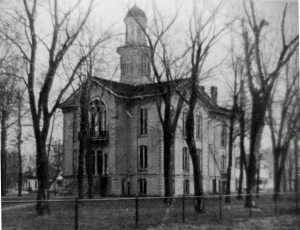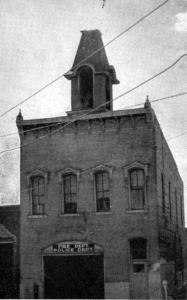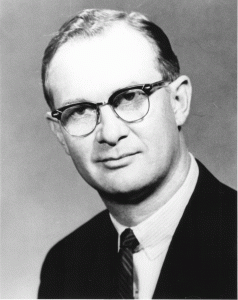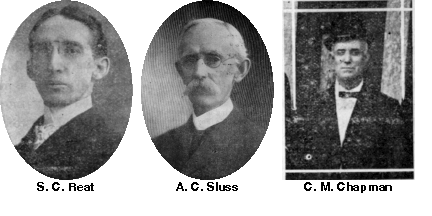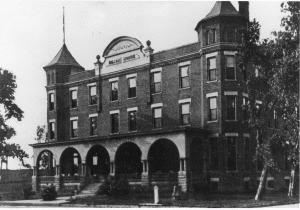
The Beach House began its existence as a boarding house on the northeast corner of Ensey and Parke streets. It was then under the conduct of Henry Beach, called “Pap” for short. Some time after his death, the first hotel was burned to the ground, say October, 1869, and rebuilt by Mrs. Beach in 1870. Mrs. Beach proved fully equal to the task of keeping a hotel. The house was second to none outside of large cities; indeed, traveling men preferred the home life comforts here to the more brilliant but not more comfortable caravansaries.
The first hotel was the one on the site now occupied by the so-called Stanley House. It was the Tuscola house. It caught fire at 7:30 o’clock one morning in ’64, and was the first chance we had to recognize the firemen of the town. We all did pretty well. Even old Cole Bright had a hole burned in his back and thought Tom Macoughtry did it on purpose. Vanduren spread himself on this occasion and undertook to tell Niles how to put out a house a fire, though he had served his time at the business. Niles and Chappel stayed upstairs just because they could, and tore out bedsteads, smashed looking glasses and pitched furniture out of windows with a vengeance. Most of the furniture was saved but the house went out.
Same way at the Beach House, same site as present location. We got there too late to save the house. Griswold’s store burnt where his place now is; got the alarm when it was about over. Again Alf Thayer’s stable on Main Street burned. By George! That soared us! It was in close proximity to the north row on Sale Street. If we just hadn’t worked like fury, the whole north side of Sale Street would have gone
Luckily water was plenty. We kept everything wet in the vicinity, including the firemen. Niles had just gone into partnership with Davis in the drug business, within 160 feet of the blazing barn, and not a cent of insurance. Perhaps everybody worked hard to keep the fire from Sale Street. Niles had a “posish” on the roof nearest the fire.
Dryer, that’s Walt, the druggist that was, was navigating between the comb of the roof and a place where Niles and himself crossed each other in getting a supply of water, for the fellows that took the hot places were allowed to hold them and every time Walt came down from the roof his feet slipped and he slid V-shaped on his broadest part in time carefully calculated to knock the other man’s feet from under him at the intersection of their beats. So they both went off the roof together and fell about 40 times, 12 feet in the mud below.
Dryer said this was nothing to what he used to do in Rochester and Penfield, so the other man said it was alright, though, at first he thought it was done on purpose. Ike Jewell said he slid off the roof of that two story building which now stands opposite the Union block, and saved himself by catching with his hands the eaves through; hung there awhile till he got rested, and then drew himself up again. Most any other man would have dropped 40 feet to the ground and killed himself.
The fire cost Alf Thayer 14 head of horses and other property, but it was such a relief to save Sale Street that we fear his great loss was almost forgotten in our great gain. And again, in February 1870, W.H., Lamb’s dwelling where L.J. Whyeth now lives, caught fire. Here to use the expression of an insurance man, we literally “clawed it out.” We also stopped a fire in Hull’s two-story house near the M.E. church.
Newlin’s house burned in 1870. We saved most of it. Van Meter’s property on Wilson Street quietly burned out without any fuss. These fires, however, sink into comparative insignificance when compared with the fire we talk about. It was the fire “par excellence” so to speak. It began at 10 o’clock at night on the 11th of March “73 in a grocery in Block A, on Parke Street. The place is vacant now, and is nearly opposite the brick barber shop where David Smith holds forth. The Caricos had a large party at the dwelling where Major Conover now lives, and the first sound to persons at a distance was a loud explosion of gunpowder, and then we went to the fire.
The west side of Parke Street was well under way; the heat soon making it impossible to pass the street. We worked very hard on the building opposite, until fairly cooked out. Well she came across the street; we kept backing out and took the only course possible to do any good. We tore out buildings and stopped her on Sale Street, just east of Joe Kornblums. Then we went on the Avenue, merely to satisfy ourselves that commercial block, our pride and glory, was safe. Well it wasn’t, but they had been at work, and Jim Trownsell had saved almost all of his large and valuable jewelry stock and afterwards found time to do yeoman service as a fireman. She burnt, around to the present location of VanLankin’s shop, and with what assistance we could give by the way of tearing down, she finally went out for want of fuel.
Several active firemen who had sworn off from fires, till apparatus was bought by the city, pitched in, in the usual effective style of active men, and many who were not the oldest of old residents, proved valuable to the impromptu fire department.
Trownsell and the Ervins, for instance, Bob Macpherson, after the fire was under subjection, insisted that his hair and eyebrows were burnt off, and that he was “burnt inwardly.” We believe the latter part of his statement, for many of us were in the same interesting situation.
Commercial block, while not as imposing a building as the present opera block whose site it occupied, stood over five handsome store rooms, contained one of the best public halls in the state, 40 x 80 feet, with an arm chair seating capacity of 800, stage, side scenery, ante-room and handsome drop curtain. We were proud of it. In the building was the Masonic Hall conceded to have shown the best floor in the state. No expense had been spared in its decoration, and if the committee had found another spot upon which to delineate another symbol or “totem” with taste and effect, they would have filled it. Here was absolutely nothing saved. It was in the third story and all hoped to put out the fire before the block was reached. But in vain, for it seemed to have got in through the back windows before we realized the fact.
Tuscola has no fire organization. We always hold a meeting after every important fire and pass some resolutions. This seems to stop the fires for a while, but it should not be relied upon as an organization of any great force. One hundred and fifty dollars will buy the necessary ladders, hooks and chains and buckets. It is, since the fire that the people of Tuscola refused to vote a small appropriation for fire apparatus.

